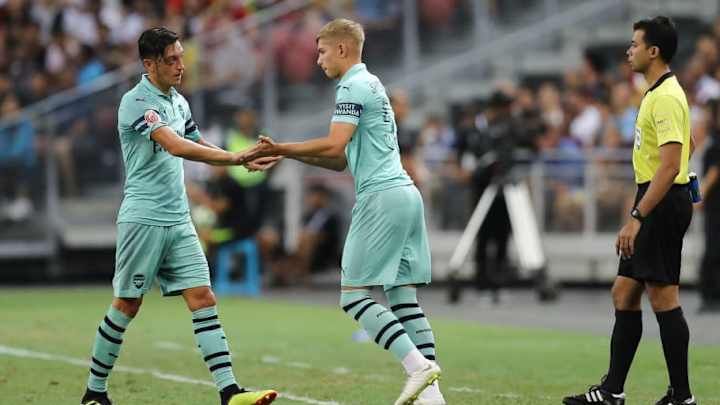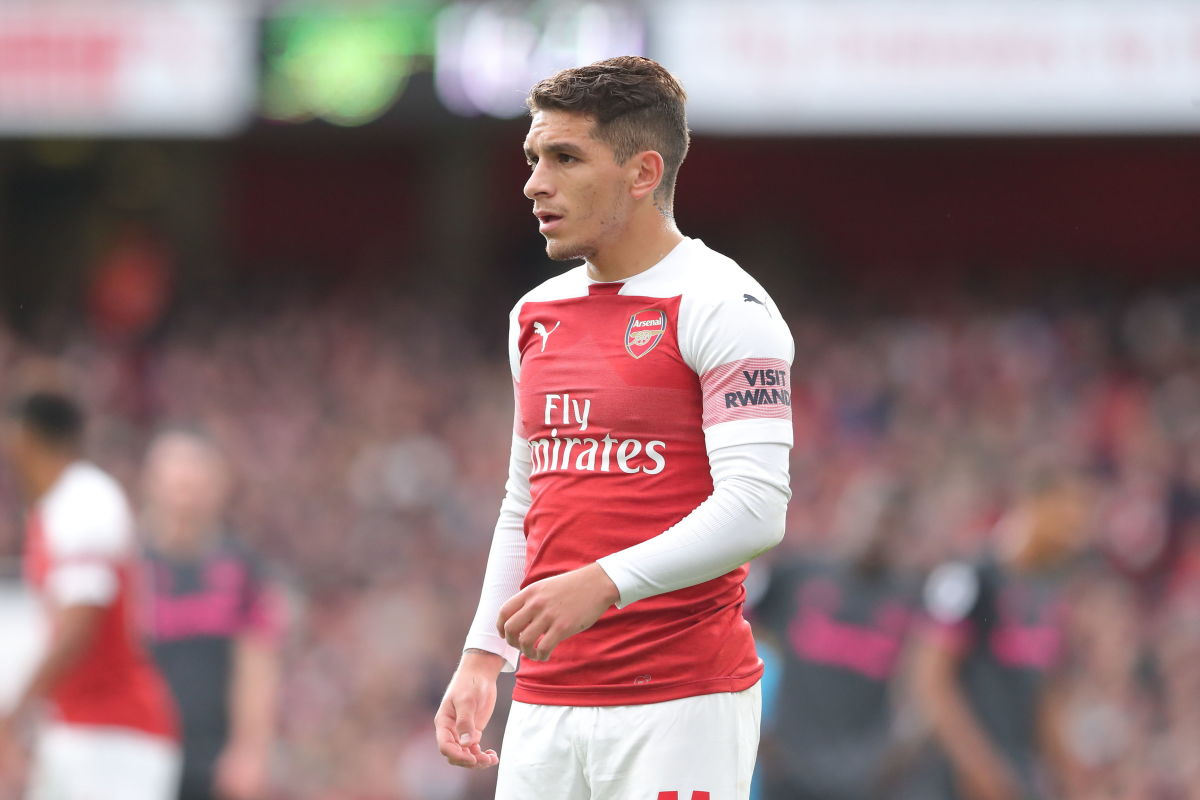Why Arsenal's Youth Development Promises Brighter & More Sustainable Future Than Big Spending Rivals

Though Arsenal’s summer transfer window under Unai Emery was productive, the Gunners were criticised by many for failing to bring in any real 'star' names that would galvanise the team and the fanbase ahead of the 2018/19 season.
Rather typically, the Gunners’ business was greatly overshadowed by the big-spending exploits of their rivals.

Arsenal’s weak spots were strengthened but at far less expense. Lucas Torreira was signed to reinforce Arsenal’s problematic holding midfield position, but his fee was dwarfed by the £57m that Chelsea splashed on Jorginho to fill a similar space.
The signing of a top-quality, long-term goalkeeper was also a priority for the Gunners, and the £19m acquisition of Bernd Leno appeared to be solid business, but it paled in comparison to Liverpool’s £67m deal for Alisson.
The signing of Sokratis Papastathopoulos for £17m was completed with the intent of providing the solid defensive leadership which Arsenal had long been lacking in their backline, but it was a long way short of the statement of intent made by Liverpool in splashing £75m on Virgil van Dijk in January to fill a similar vacancy at Anfield.
All of them. Bringing young players through and giving them chances on the biggest stage is a massive part of what this club is about.
— Dan Critchlow (@afcDW) September 26, 2018
Every time a Smith Rowe or an Nketiah steps onto the pitch for the first team it’s a proud moment. https://t.co/jD1c3J0hin
Arsenal’s conducting of opportunistic, ‘smart’ business during the summer proved that they are not out to match their counterparts in terms of mega-investment to reach the top.
Stan Kroenke’s recently-completed full takeover of the club may serve only to continue that approach at the Emirates. The apparent £50m budget on which Arsenal operated during the summer is indicative of the American’s withdrawn level of investment in the club when it comes to player recruitment.
However, whilst fans of a club of Arsenal’s stature love to see a superstar name arrive as a big money signing in a transfer window, there is little more that can excite a supporter more than seeing one of their own rise through the ranks of their club’s youth system and become a first team star.
This is the first time in a while that Arsenal has more young growing players than players near the end of their career. The future is looking very very bright under Unai Emery. pic.twitter.com/mEXZ1iij2w
— Dylan (@AubaLacaFlocka) September 25, 2018
In that sense, the Gunners’ strength and advantage over their rivals may come from within.
Unai Emery spoke passionately upon his appointment as head coach during the summer of his intent to continue to build upon Arsenal’s traditions and values as a club. One of the central components of the Gunners’ DNA has always been the development of young players.
Arsene Wenger infamously declared in 2007: “We don’t sign superstars, we make them.”
Rob Holding has put in a very decent shift having come on for Sokratis.
— Charles Watts (@charles_watts) September 23, 2018
That assertion from the Frenchman came amid the Gunners’ move from Highbury to the Emirates, a transitional phase which saw Arsenal forced to sell many of their star players to fund the move to their new home.
Wenger’s sentiment remains highly relevant at the club.
During that period, the likes of Cesc Fabregas and Robin van Persie were brought in and developed from virtual unknowns to world stars to replace icons such as Patrick Vieira and Thierry Henry.
Emile Smith Rowe is set to make his full Arsenal debut on Wednesday.https://t.co/nO5YaNrbTG pic.twitter.com/glkawo2SFT
— BBC Sport (@BBCSport) September 25, 2018
A decade on, the continued integration of Eddie Nketiah, Reiss Nelson, Joe Willock and Emile Smith Rowe into the first team under Emery is telling as far as squad development at present is concerned.
Emery is not building towards a team of global 'galacticos', but rather one of home-grown heroes.
Arguably the biggest cheer of the night at the Emirates as Arsenal hosted Vorskla Poltava in the Europa League was not for star striker Aubameyang as he netted a decisive and match-winning brace, but for young Smith Rowe as he came on to make his competitive debut for the Gunners.
Emile Smith-Rowe makes the first-team squad photo, a clear sign of how he is now viewed by Unai Emery. Nketiah also makes it. And Carl Jenkinson, obviously. pic.twitter.com/J9bIsKc6py
— Charles Watts (@charles_watts) September 18, 2018
Arsenal fans were delighted to welcome the strides of their latest prodigy into the first team.
According to Football.London, in a recent boardroom meeting between Arsenal’s managing figures and representatives of the club’s major fans groups, newly-appointed head of football Raul Sanllehi spoke ‘passionately’ about the importance of having a squad which possesses ‘four or five’ players who had come through the youth ranks of the club.
Sanllehi apparently stressed the importance of such players transmitting their ‘passion and love’ for the club to the rest of the squad in order to create a positive, winning mentality. This notion is comparable to the all-conquering Barcelona squad during Sanllehi’s time as director of football at the Camp Nou which featured Lionel Messi, Xavi, Andres Iniesta, Gerard Pique, Carles Puyol and Victor Valdes as a home-grown nucleus for the squad.
EXCLUSIVE Emile Smith-Rowe: "I was playing at Bishop Auckland for Arsenal last season and now I’m in the Europa League." Read my one-to-one interview with the humble and hard-working @emilesmithrowe @islingtongztte https://t.co/BFvamwsJlG
— Layth (@laythy29) September 22, 2018
With the likes of Alex Iwobi already in the current Arsenal first team squad, and with Nketiah, Nelson and Smith Rowe well on course to becoming future senior stars at the Emirates, there is a growing sense that a similar pattern in unfolding in Emery’s squad.
Whereas their rivals have consistently displayed a will to fill voids by investing upwards of £50m on a player best suited to the role in recent years, there is a sense of reluctance from Arsenal to do likewise.
Rather, it is an inward look to their own ranks which seems to prevail in providing the solutions through their own resources.
Alex Iwobi is enjoying life under Unai Emery at Arsenal! pic.twitter.com/0IBlkfFDkY
— GOAL (@goal) September 21, 2018
Emery has challenged young defender Rob Holding to build on his recent game time and cement his place in the starting XI through impressive performances. A van Dijk-esque signing is not on the agenda.
Similarly, in the wide areas, a big-money move for Barcelona star Ousmane Dembele was widely touted for upwards of £100m during the summer to bring the desired attributes to Arsenal’s right flank. Realistically, such a move was never going to materialise.
Rather, Unai Emery is seemingly biding his time with the likes of Henrikh Mkhitaryan on the flank until Reiss Nelson is ready to step up and make the position his own.
Laurent Koscielny on Alex Iwobi in his programme notes: “He needs to realise how good he could become.” pic.twitter.com/kjrDZ8PxPJ
— Mattias Karén (@MattiasKaren) September 23, 2018
Whilst the immediate term at Arsenal may appear permeated with temporary fixes and unspectacular business, the long-term future is being built on foundations which are much more exciting. By contrast to the big-spending splurges from their rivals, it is seemingly much more sustainable in the long run for the development of a squad which truly wears the Arsenal badge with pride and determination to succeed, both for themselves and for their club.
